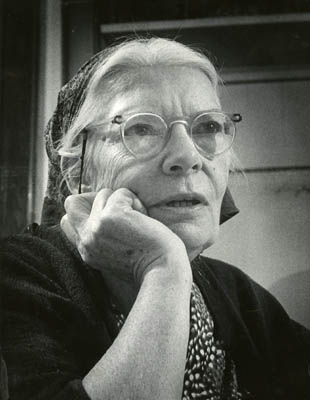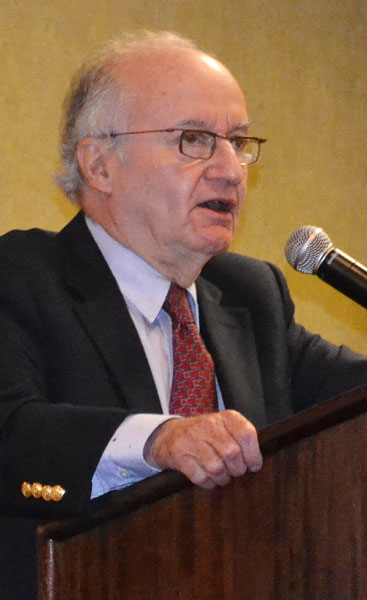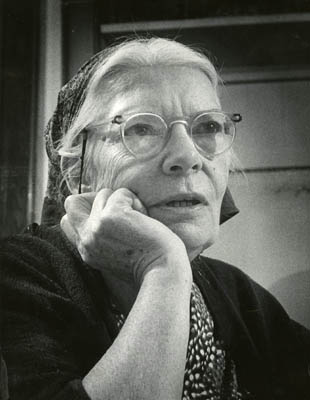
Dorothy Day founded the Catholic Worker Movement in 1933 and became what
many consider to be an American saint. She is seen here in 1968.
(RNS) God’s role in our political system was prominently mentioned during the recent Republican debate, even more than the economy. Some presidential wannabes, sounding more like candidates for preacher-in-chief instead of commander-in-chief, believe God supports the Grand Old Party and their campaigns for the White House.
The debate forced me to seek the views of four famous religious leaders who grappled with the relationship between religion and society: Dorothy Day (1897-1980), a Catholic social activist and a candidate for sainthood, Moses Maimonides (1135-1204), a philosopher, rabbi and physician, Reinhold Niebuhr (1892-1971), a Protestant theologian and champion of “Christian Realism,” and Stephen Wise (1874-1949), a prominent, politically active rabbi.
Day, the founder of the Catholic Worker Movement, staked out her position: “What we would like to do is change the world — make it a little simpler for people to feed, clothe, and shelter themselves as God intended them to do. And, by fighting for better conditions, we can, to a certain extent, change the world.”
READ: Why some conservative Christians like Donald Trump (COMMENTARY)
But she was no naive “do-gooder.” “Our problems stem from our acceptance of this filthy, rotten system,” Day said.
Wise was equally clear: “To me neither religion nor politics was remote or sequestered from life. Religion is a vision or ideal of life. Politics is a method, or ‘modus vivendi.’ … One of the dangers of all of us is that we are willing to fight for justice for ourselves alone, forgetting that justice will be for all or none.”
Niebuhr asserted: “The sad duty of politics is to establish justice in a sinful world. … Man’s capacity for justice makes democracy possible, but man’s inclination to injustice makes democracy necessary.”
READ: Donald Trump and the politics of white male anger (COMMENTARY)
Maimonides and Day criticized simple “charity.”
Day wrote: “(C)harity was a word to choke over. Who wanted charity?” What is required is “a strong sense of man’s dignity and worth, and what was due to him in justice.”
Medieval rabbi Maimonides advised: “Anticipate charity by preventing poverty.” And he supported what is today called vocational education and training: “Give a man a fish and you feed him for a day; teach a man to fish and you feed him for a lifetime.”
READ: Five spiritual qualities Trump could learn
Wise agreed: “The stricken ask not for the occasional tonic of charity, but the daily meat and substance of justice.”

Reinhold Niebuhr, then-dean emeritus of New York’s Union Theological Seminary. Religion News Service file photo
Many presidential candidates salute “the corporate sector” and “the marketplace.” But not Wise.
“Business (needs to) be completely moralized; we need to ethicize what might be called the processes of creating and production, of distribution and consumption. … No business … can long endure if it be bound up with the evil of unemployment … and all those other social maladjustments … which we lump together under the name of poverty …. The first business of democracy is to be the industry of turning out completely effective, completely free and self-determining citizens. … Conscience demands that business … recognize that articles of incorporation are not to be offered as a substitute for the Decalogue!” (Also known as the Ten Commandments)
Niebuhr hated political leaders who claimed that God was “on their side.”
“The tendency to claim God as an ally for our partisan value and ends is the source of all religious fanaticism,” he said. And he abhorred clergy who uncritically extol the political system and journalists who are cynics of society:
“I think there ought to be a club in which preachers and journalists could come together and have the sentimentalism of the one matched with the cynicism of the other. That ought to bring them pretty close to the truth.”
Maimonides was critical of leaders who are never in doubt: “Teach your tongue to say ‘I do not know,’ and you shall make progress.”

Rabbi A. James Rudin, the American Jewish Committee’s senior interreligious adviser, is the author of “Cushing, Spellman, O’Connor: The Surprising Story of How Three American Cardinals Transformed Catholic-Jewish Relations.” RNS photo courtesy of Rabbi A. James Rudin
Nor was he impressed because someone wrote a book: “Do not consider it proof just because it is written in books, for a liar who will deceive with his tongue will not hesitate to do the same with his pen.” Maimonides had advice for our polarized society: “You must accept the truth from whatever source it comes.”
Day criticized people who admire political leaders because they “stick to their beliefs.” She warned: “We must recognize the fact that many Nazis, Marxists and Fascists believe passionately in their fundamental rightness, and allow nothing to hinder them from their goal.”
Finally, there is no doubt about what would be Day’s position in the current battle between newswoman Megyn Kelly and presidential candidate Donald Trump, who objected to her debate question about his disparaging comments about women.
“Women think with their whole bodies and they see things as a whole more than men do,” Day said.
(Rabbi A. James Rudin is the American Jewish Committee’s senior interreligious adviser. His latest book, “Pillar of Fire: A Biography of Rabbi Stephen S. Wise,” will be published by Texas Tech University Press this fall.)
LM/AMB END RUDIN





